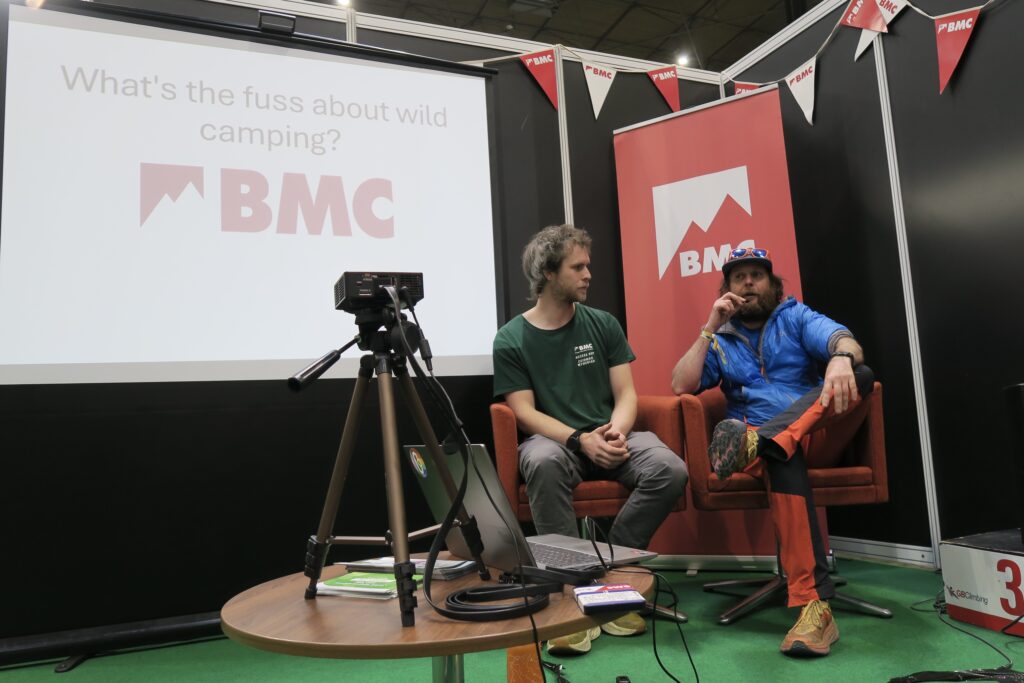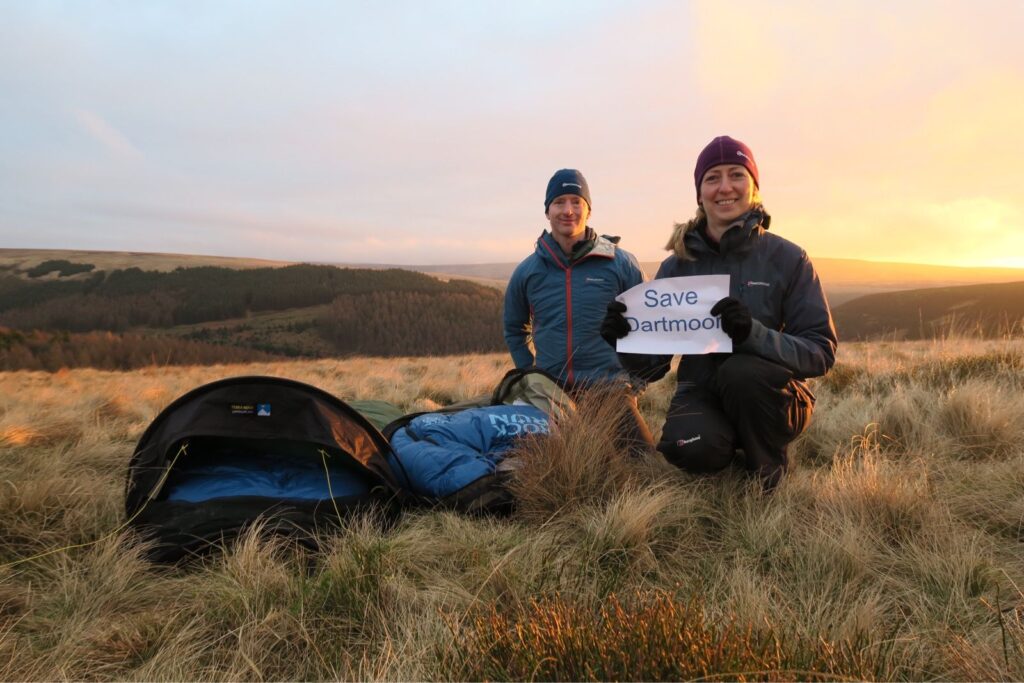A panel discussion at the BMC Stand at the National Outdoor Expo 2025
On a packed Sunday afternoon at the National Outdoor Expo, a group of us gathered at the British Mountaineering Council (BMC) stand for a panel discussion on one of the most hotly debated topics in the outdoor world, and one that is making headlines: wild camping. The panel featured Eben Myrddin Muse from the BMC and seasoned adventurer and special educational needs and outdoor teacher Mark Hayhurst, both of whom have been deeply involved in access issues across England’s national parks and beyond.

Understanding the Landscape: Legality, Connection, and Confusion
Wild camping is a relatively modern term for something people have done for millennia. Previously referred to as bivouac camping, it remains famously illegal in most parts of England, with few exceptions such as sections of Dartmoor National Park. Even these rights have come under threat in recent legal disputes. In contrast, Scotland’s right to roam laws allow people far greater freedom to camp responsibly in the wild.
The panelists noted that this legal disparity creates significant confusion among would-be wild campers in England. While post-pandemic interest in outdoor reconnection is rising, many are unsure about the legality of camping outside official sites. This uncertainty is compounded by companies marketing products and experiences around wild camping, sometimes without clarity on legal standing.
“We are wild animals,” one speaker said, reminding us that our instinct is to connect with nature. Wild camping offers that connection. But the more regulated it becomes, the more difficult it is to maintain that bond. The panel noted the important role wild camping plays for young people, such as those taking part in Ten Tors on Dartmoor, where these experiences can ignite a lifelong respect for the natural world.
Barriers and Misconceptions
Social and cultural barriers were a key part of the discussion, particularly how women and marginalised groups often feel unwelcome or unsafe when wild camping. Reversing this stigma, the panel agreed, requires more than legal change; it demands the creation of a culture of trust and responsibility in outdoor recreation.
Practical challenges were discussed, including problematic behaviour like cutting down trees or leaving litter. Mark shared an anecdote from France’s Les Ecrins mountains, where local bylaws allow bivouac camping from 7 pm to 8 am. When asked to move to allow a shepherd access, he simply packed up and moved, underscoring the value of respectful engagement.
Leading by Example and the Role of Dialogue
Both Mark and Eben emphasised the importance of leading by example, picking up litter, alerting landowners to animal welfare concerns, and engaging in positive conversations with those who manage the land. Eben argued that we should view littering in wild spaces not as a wild camping problem, but as a litter problem more broadly.

The Dartmoor Debate and Its Wider Implications
A significant part of the discussion focused on the legal battle over Dartmoor. Certain landowners have claimed that wild camping doesn’t qualify as “open-air recreation” under the Dartmoor Commons Act, arguing instead that people should only pass through, not stop. The potential impact of this argument is vast, possibly affecting birdwatchers, climbers, cavers, and anyone who takes a break on their walk.
FOI data cited by the campaign group The Stars Are For Everyone shows that most Dartmoor wildfires stem from swaling, controlled burns by landowners, not from campers. Yet wild camping continues to be scapegoated. There is also evidence of illegal swaling on deep peat without licences.
Charging for Access: A Risky Precedent
The conversation moved to the controversial issue of charging for wild camping. Pilot schemes, including one that charged up to £20 a night, sparked backlash. The BMC is clear: it does not support the principle of paying simply for the right to camp on land, particularly within national parks.
Following the loss of legal wild camping in Dartmoor, a scheme was introduced by the National Park Authority to pay landowners who opted in. The DNPA reported payments of up to £300 annually. While some landowners returned the payments, others accepted them, raising questions about commodifying what many see as a basic right.
Mark pointed out that moving to a paid model could jeopardise long-standing, informal acceptance in places like Snowdonia and the Lake District. If landowners begin to expect payment, access could become more exclusive, undermining generational freedoms.
Farming and the Future of Shared Landscapes
The discussion acknowledged the concerns of the farming community, average age 59, with rising isolation and mental health issues. Eben noted that some farmers are beginning to see outdoor visitors as part of their community rather than a problem. Frameworks that respect local concerns while promoting access could offer a way forward.
Scotland offers a helpful model. Instead of broad restrictions, there are strong penalties for specific misconduct, such as £40,000 fines for sheep worrying. This targeted approach avoids punishing the many for the actions of a few.
Legal Frameworks and the Role of Campaigns
The panel suggested that legislation allowing responsible wild camping could offer clarity and balance, supporting both nature and recreational use. Advocacy groups like Right to Roam, The Stars Are For Everyone, and the BMC are leading the way, with the BMC planning a focused campaign this summer.
Online communities, especially Facebook groups, also play a significant role. These spaces offer peer support, gear tips, and advice, particularly helpful for beginners. One speaker noted how the positivity in these groups stands in contrast to the fear-based narratives often pushed in legal debates.
Getting Started: Advice for Newcomers
Audience questions brought up the difficulty of identifying legal or tolerated wild camping spots. Land registry searches cost £7 each, making them impractical for most. The panel’s advice? Do your homework, respect the land, arrive late, leave early, and always leave no trace. Mark shared another example of being asked to move on and doing so respectfully.
As one panelist put it, “We should pay if services are provided, like toilets or water. But paying for the simple act of lying down under the stars? That’s different.”
Conclusion: A Quiet Act of Belonging
The session ended with cautious optimism. Public opinion appears to be shifting, and even the current Environment Secretary is said to be a fan of wild camping. Still, legal change must be accompanied by education and community building.
“Wild camping is about restoration, community, and reclaiming our place in nature,” one panelist concluded. “It’s a quiet act of belonging, and it should be open to everyone.”
Further Resources and Actions
- British Mountaineering Council (BMC): Follow their upcoming summer campaign for wild camping rights and best practices.
- Right to Roam and The Stars Are For Everyone: Join their grassroots efforts to protect public access.
- Online Communities: Facebook groups and forums are valuable for tips, advice, and camaraderie.
- Read More: Articles by Helena Horton and Phoebe Smith offer deep dives into Dartmoor’s legal issues and the debate over paid camping schemes.
Wild camping, at its heart, remains a call to step away from the everyday, reconnect with our planet, and embrace the simplicity of sleeping under the stars. Whether that freedom endures and for whom depends on conversations like these and how we act upon them in the months ahead.
For more about the National Outdoor Show this year have a read of: https://richardcole.me/2025/03/national-outdoor-expo-2025